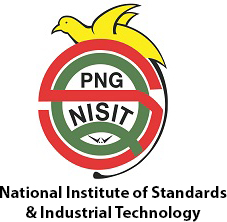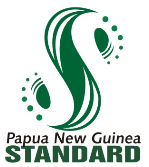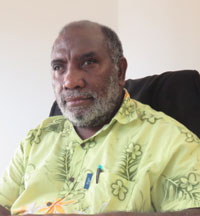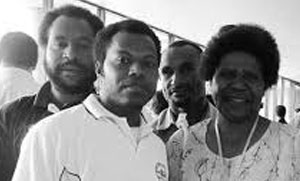





Mr. Dan Yansom leads the Standards Development Division. He has been performing this role since February 2007. He holds a Bachelor of Engineering in Civil Engineering from the Papua New Guinea University of Technology. Prior to joining NISIT, Mr. Yansom has worked in the petroleum sector, having spent nearly 10 years in different roles with Mobil Oil New Guinea Limited, SGS Oil & Gas Inspection Services, Pacifica Marine, and InterOil Products Limited. He has had work engagements with Mobil Oil Australia, Mobil Oil Micronesia, and Mobil Oil New Caledonia rolling out the ExxonMobil Product Quality Management System.
Standards development requires a lot of inputs from different stakeholders and interest groups. Therefore, it is paramount that credit is given to the many technical experts who offer their time and knowledge ‘free of charge’ to standards development work at NISIT. The 900 or so Papua New Guinea Standards (PNGS) adopted and/or produced to date cannot be achieved without the expertise provided by these group of people.
At this point in time, the national economy is heavily dependent on foreign aid and investments from countries such as Australia, New Zealand, USA, and some countries in Asia. As such, the standards of these countries seem to dominate how goods and services are made available to Papua New Guineans. In this manner, local conditions are not taken into account thus, the quality of these goods and services can be compromised in some ways. Adding to this challenge is the globalization game being played around the world. Developing countries such as PNG with its little capacity in technical knowledge and technology have great difficulty in adapting to the evolving trends of international trade.
Papua New Guinea is a signatory to international trade treaties and regional trading blocs such as the World Trade Organization (WTO), United Nation Sustainable Development Goals (UN-SDG’s), and Asia Pacific Economic Cooperation (APEC). With its limited technical knowledge and technology; PNG struggles to contribute meaningfully to achieving the set objectives of these treaties. Developing our own National Standards and aligning them to International Standards can be an effective tool to rectify this issue.
Thanks to management for restructuring the NISIT organization, and the Commonwealth Standards Network under the United Kingdom Department of Foreign International Trade, real efforts are now being made to build capacity within the Standards Development Division to try and rectify the challenges identified. With this assistance, the standards development function of NISIT should become effective and efficient in capturing the standardization needs of Papua New Guinea as they relate to the economic, social, physical, and environmental welfare of the country and its people.
The Division is established to implement the functions of NISIT as specified in Sections 5(a), 5(d), 5(g), and 5(ai) of the NISIT Act of 1993. To do this, several technical committees have been planned and earmarked to cover standards development work on various fields including Biology, Building, Construction, Electrical Appliances, Electronics & Renewable Energy, Food, Industrial Chemistry, Mechanical, Organic Chemistry, and Services. At the present time, standards development and verification work are active for the Building, Construction, Food, Electrical Appliance, and Mechanical fields. The committees are supported by a Standards Development Officer who provides all the secretariat functions.
The Standards Development Division is led by an Executive Manager and three ‘active’ Standards Development Officers. The Division the Standards Information Officer with the Corporate Services Division. Whilst the Executive Manager has over 13 years working experience in NISIT, the standards officers have varying levels of experience within the organisation ranging from 1 to 8 years. Qualifications of staff members are first degrees in applied chemistry, building technology, civil engineering, and mechanical engineering.
To date, there are approximately 900 PNG Standards of which 5% are home grown. The remainder are adoptions of Australian (AS), New Zealand (NZS), Joint Australian & New Zealand Standards (AS/NZS), International (Codex, IEC & ISO) and ASTM Standards.
In the process for standards adoption, it should not take more than 6 months to complete. It follows the committee review, public comment, ballot and then publication. For any standards which will be developed from the initial stage, the process takes up to 1.5 years to complete. For both line of work, the technical aspects are usually fast to complete however, the administrative and legal issues, if any, at the gazettal and publication stage will delay the project completion.
The NISIT Standardization Directives Part 1 and Part 2 provides the mechanism on how Papua New Guinea Standards shall be adopted and/or developed. These documents are adopted from the ISO/IEC Standardization Directives and customised to the economic and social operating conditions of Papua New Guinea.
When a Standard is published, it is gazetted by the PNG Government after approval by the Minister for Commerce & Industry. All Papua New Guinea Standards (PNGS) are ‘voluntary’ documents unless they called up in legislation. When a Standard is adopted as a PNGS, it is allocated a unique number. For example, PNGS/AS 3000 for electrical wiring rules. This Standard is ‘mandatory’ as it is called up in the Papua New Guinea Electricity Regulation.
NISIT is a ‘corresponding’ member of the International Organisation for Standardization (ISO), and a member of the International Electro-technical Commission (IEC) Affiliate Country Programme. NISIT is also a member of Pacific Area Standards Congress (PASC) and it represents Papua New Guinea at the Asia-Pacific Economic Co-operation (APEC) Sub-Committee on Standards and Conformance (SCSC). In addition, NISIT also participates in the Part 1 (regulatory and standards requirements) of APEC Electrical & Electronic Mutual Recognition Arrangement (EE MRA).
At a national level NISIT has connections with:
A document approved by a recognized body, that provides, for common and repeated use, rules, guidelines or characteristics for products or related processes and production methods, with which compliance is not mandatory. It may also include or deal exclusively with terminology, symbols, packaging, marking or labeling requirements as they apply to a product, process or production method.
According to the World Trade Organization (WTO), Standards are technical barriers to trade (TBT). The other two being regulations and conformity assessment procedures. Therefore, according to the WTO-TBT definitions, a Standard becomes a Technical Regulation when compliance is made ‘mandatory’. However, there are other technical regulations that are not standards, for example, the European Union (EU) Directives or performance requirements in building codes. Even the ‘voluntary’ standards have an effect on trade, especially when used in contracts, so the WTO rules make good sense.

The Center also provides a more-customer incentive-based service for those registered in the Subscription Services arrangement here at the Institute. Under the Subscription Services, only limited bonus packages and other additional incentives relating to sales purchase arrangements are offered. A general set of conditional requirements apply to all subscribers. Anyone either individual or corporate can become subscribers. Examples include Individuals, Manufacturers, Consultants, Contractors, Product and Service Businesses, Government Department & Agencies. In general, anyone who would want to benefit directly from the Standards Information and Sales Services offered here at NISIT with added incentives can apply to become a subscriber.
All registered subscribers will be notified of the scope and validity of the subscription services upon registration. Subscription fees will have to be paid for activation. Once becoming a member, Terms and Conditions for subscription apply. Subscription Fees are for annual subscription period only and subject to renewal on annual basis at the beginning of the New Year.

The Institute through the Center is tasked with the mandate for the sales of Published National Standards, and selected other foreign National and International Standards to all interested organizations, companies, individuals including the general public all over Papua New Guinea. The Center facilitates sales of Standards through the following Sales Arrangement namely:
All Standards for sales purposes are categorized against ‘Standard price codes’ for which the Regular Sales Price is approved by the Institute’s Management. All approved prices are fixed and applied accordingly on all the Standards and all other Standards-related Products sold at the Center.
The Center facilitates over-the-counter sales when purchasing Standards from the Institute. This can be done for either single or bulk purchase of Standards and is effected straight at the time of purchase with the availability of stock at hand. Often the purchase and delivery can be conducted over a day or two pending stock availability and delivery arrangements. Over the counter sales can also be effected through a personal basis here at NISIT Office.
The Center also facilitates sales and delivery of Standards through registered Freighting Services or through postal services for clients outside the National Capital District. Clients will be advised on the total cost of the arrangement which includes postage and handling. Delivery of postage items is dependent upon the local carrier services throughout and around Papua New Guinea. However, all clients are encouraged to notify NISIT upon receipt of the sent postage items.
The Center also facilitates Standards sales purchases through overseas ordering facility arrangements with our network of Standards Organizations for stocks not readily available at the Center. This can be facilitated through orders to be processed through our established Ordering Facilities for International Standards (ISO, IEC, etc) and Other Foreign National Standards (AS, ANZS, BS, etc). The arrangements allows for the purchase to be effected over a period of between 14-30 days. Postage and handling costs are included in the Sales Invoice. Overseas arrangements are facilitated through renowned courier services operating here and abroad for ease of convenience, reliance and efficiency.

The Center also aids in the facilitation of the Sales of Other Standards-related Products. In general, these include other Standards-related Publications, which may include:
These are part of the wider Standards-related Publication products by other Foreign National Standards Bodies, International Standards Organizations and other recognized SDOs. At present, these Products are sold by NISIT through its overseas facilitation arrangement and are limited to those published or produced by Standards Australia. Sales quotations and invoices are subsequently provided upon request or for initiating sales arrangements from our end.

The Standards Information Services is coordinated and managed by our call-center and an enquiry and administrative desk. We have a call center Facility through which interested persons can call, email or fax enquiries regarding standards information. All enquiries are attended to promptly pending the nature, scope of the enquiry together with the availability of information to be supplied accordingly. All information are supplied or communicated either through facsimile, email or through phone calls. All information is sourced from our wide and extended source of reference Standards collections maintained in the Facility. Basically, the Center maintains a collection of standards published by the NISIT, other foreign National Standards Setting Bodies and International Standards Setting Bodies. The Center maintains facilities for shelving and displaying copies for the International Standards, all other foreign National Standards and the Papua New Guinea Standards (PNGS) for the purpose of public viewing, information and research.
The Center is responsible for providing general guidance and advice on the Standards, their availability, currency, scope of application and implications (benefits and considerations). Other additional or detail technical information and advice are provided by the Technical Teams of the Institute. The advice and information covers Standards that are kept and maintained within the Information facility. To date, the Standards that are kept and maintained in the Standards Information & Sales Center include the following:
The Center has access to and maintains approximately 30, 000 in total National, other foreign National Standards and International Standards from the list of affiliated National Standards Bodies (NSBs) and International Standards Development Organizations (SDOs). The Center ensures that Standards from these Organizations are maintained and updated regularly to ensure that the “most up-to-date information on products, processes and services Standards” are made available for dissemination from the Information Desk of the Center. The Center to date has in its collection or has access to:
The Services available for information dissemination purposes are:
The Information & Sales Center maintains several “Standards Catalogue” which are on display at the facility for guidance and direction in aiding in the search for Standards and all other Standards-related Publications. The Center maintains various Standards Catalogue for ease of reference as all the published Standards are listed in the Standards Catalogue.
Powered by CloudcodeDisclaimer Terms & Conditions
